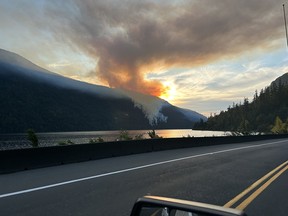Top Stories
Urgent: B.C. Wildfires Surge to 147; Alberta Faces Heat Wave Risks

URGENT UPDATE: As of July 14, 2023, British Columbia is grappling with an escalating wildfire crisis, with crews battling 147 active wildfires across the province. This surge includes 41 new fires that ignited overnight, prompting officials to issue warnings about air quality and safety as the summer heat intensifies.
The situation is further complicated by a significant heat wave affecting nearby Alberta, where firefighters are on high alert with 53 wildfires currently reported, including 11 out of control. Temperatures across Alberta are expected to soar above 30°C this weekend, raising the risk of new fire outbreaks as families gather for the long weekend.
In British Columbia, the Peachland wildfire, which previously forced hundreds to evacuate, has seen some containment, with evacuation orders now lifted for those residents. However, new evacuation orders have been issued for areas near Cameron Lake on Vancouver Island, where the Wesley Ridge wildfire has rapidly expanded to 2.45 square kilometers since Thursday.
Travelers are urged to reconsider plans as B.C.’s hot and dry conditions persist, despite some areas having lifted heat warnings. “The August long weekend feels like the height of summer for us,” said Ellen Walker-Matthews, CEO of the Thompson Okanagan Tourism Association. Local businesses, including those in Peachland, are hoping for continued patronage despite the looming fire threats.
Meanwhile, the Trump administration has taken a controversial step by cancelling plans for new offshore wind projects, which could impact renewable energy development in the U.S. This decision rescinds over 3.5 million acres designated for wind energy, marking a significant policy shift that opposes the previous administration’s efforts to expand wind energy sources.
In a broader context, the intergovernmental panel on climate change emphasizes that human activities contribute significantly to climate change, linking them to increased wildfire frequency and intensity. As scientists warn of a code red for humanity, the urgency for action is palpable.
Authorities are closely monitoring conditions as the situation develops, and residents are encouraged to stay informed through official channels for the latest updates on fire safety and air quality.
As the summer heat continues, the implications of climate change are starkly evident in both B.C. and Alberta. The coming days will be critical as crews work to control existing wildfires and prevent new ones from igniting. Stay tuned for further updates on this evolving story.
-

 Politics4 weeks ago
Politics4 weeks agoSecwepemc First Nation Seeks Aboriginal Title Over Kamloops Area
-

 World5 months ago
World5 months agoScientists Unearth Ancient Antarctic Ice to Unlock Climate Secrets
-

 Entertainment5 months ago
Entertainment5 months agoTrump and McCormick to Announce $70 Billion Energy Investments
-

 Science5 months ago
Science5 months agoFour Astronauts Return to Earth After International Space Station Mission
-

 Lifestyle5 months ago
Lifestyle5 months agoTransLink Launches Food Truck Program to Boost Revenue in Vancouver
-

 Technology3 months ago
Technology3 months agoApple Notes Enhances Functionality with Markdown Support in macOS 26
-

 Lifestyle3 months ago
Lifestyle3 months agoManitoba’s Burger Champion Shines Again Amid Dining Innovations
-

 Top Stories2 months ago
Top Stories2 months agoUrgent Update: Fatal Crash on Highway 99 Claims Life of Pitt Meadows Man
-

 Politics4 months ago
Politics4 months agoUkrainian Tennis Star Elina Svitolina Faces Death Threats Online
-

 Sports5 months ago
Sports5 months agoSearch Underway for Missing Hunter Amid Hokkaido Bear Emergency
-

 Politics5 months ago
Politics5 months agoCarney Engages First Nations Leaders at Development Law Summit
-

 Technology5 months ago
Technology5 months agoFrosthaven Launches Early Access on July 31, 2025




















